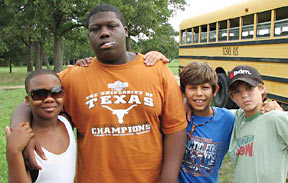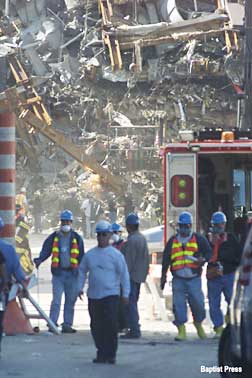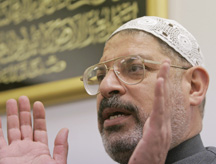Posted: 9/15/06
|
| Munir Akhtar of Kendall Park, N.J., reads in the mosque at the Islamic Society of Central Jersey before evening prayers. (RNS photo by Tony Kurdzuk/The Star-Ledger) |
Children of Abraham: Muslims view God,
church & state through different lenses
By Ken Camp
Managing Editor
DALLAS—Christians and Muslims worship the same God; the Father of the Lord Jesus Christ and Allah of the Quran are nothing alike. Jihad means an inner struggle to obey God’s will; jihad means waging holy war on infidels.
Muslims support human rights and religious freedom; Muslims practice oppression and want to impose Islamic law on non-Muslims.
Which views of Islam—the world’s fastest-growing religion—are right?
It all depends, some North Texas Muslim leaders and several Baptist university professors with expertise in Islam agreed.
“I wish all faith groups could see Islam as it is—without mixing what is happening in Iran with Islam, without confusing what is going on between Palestinians and Israel with real Islam and without viewing what is happening in Lebanon with pure Islam,” said Imam Yusef Kavakci of the Dallas Central Mosque in Richardson.
No central authority
Islam claims about 1.2 billion followers in more than 60 countries. Although Islam came into being on the Arabian Peninsula and nine out of 10 Arabs are Muslim, only about 20 percent of Muslims are Arabs. Roughly 85 percent of Muslims are Sunni, and close to 15 percent are Shiite.
 |
| Palestinian children attend a prayer during a celebration of the Islamic holiday of Isra Mi'raj in a mosque in the West Bank city of Hebron. The holiday marks what Muslims believe is the Prophet Muhammad’s journey from Mecca to Jerusalem, and it is believed to be followed by his ascension to heaven. (REUTERS photo by Nayef Hashlamoun) |
“Within mainstream Sunni Islam, there is no equivalent of the Pope who speaks authoritatively for all Muslims,” said Mark Long, director of the Middle Eastern studies program at Baylor University.
Various mufti—scholars in Islamic law—issue fatwas, comparable to decisions by judges, and pronouncements from Cairo’s prestigious al-Ashur University carry tremendous clout, but they do not have final authority, he noted.
“Muslims are very strong on the idea that there is no intermediary between Allah and the individual,” said Long, a Southwestern Baptist Theological Seminary graduate who now attends an Episcopal church in Waco. “No one has the final authority in Islam. God alone is sovereign.”
In some respects, Islam’s diversity grows out of a polity and belief that roughly parallel Baptist beliefs about local church autonomy, the priesthood of the believer and soul competency, Long noted—a similarity also underscored by Alif Rahman, who teaches an outreach class about Islam at the Dallas Central Mosque in Richardson.
“Islam does not have a strict hierarchy. The community selects a leader—an imam. Each mosque is autonomous, and leaders are elected democratically,” Rahman said. “Every human being can have a direct relationship with God without any human intermediary.”
Common ground, key differences
Ron Smith, senior professor of theology at Hardin-Simmons University’s Logsdon School of Theology, likewise stressed the importance of the certain beliefs Christians and Muslims hold in common.
“We worship the same God,” Smith said, noting “Allah” simply is the Arabic word for God and is used that way in Arabic language translations of the Bible.
“There is a different understanding of God in Islam but not a different identity. He is the same God. We have different understandings of God.”
Many Christians are surprised to learn Muslims hold Jesus Christ in high regard as a “true prophet” who was virgin-born, able to perform miracles and lived an exemplary life of holiness. However, Muslims categorically deny the deity of Christ—a crucial difference that cannot be minimized, he noted.
“There is more in common between Islam and Christianity than is widely recognized, but we are different in some important ways,” he said. “I believe Muslims are badly mistaken about some very important things but not about everything.”
Chris van Gorder, an associate professor of religion at Baylor University who wrote his doctoral dissertation on Christian-Muslim relations, and is author of No God but God: A Path to Muslim-Christian Dialogue on God's Nature, believes an essential starting point for any meaningful dialogue between Christians and Muslims is examining what kind of God their faith reveals.
“Both traditions agree that God is one, but they have widely divergent views on how that oneness is expressed,” he said.
“The basic distinction between Islam and Christianity is a difference in the conception of God’s relational nature. … In Christianity, ‘God is love’ and thus participant. In Islam, ‘God is one” and thus beyond the limits of finite comprehension. Christianity calls individuals to enter into covenant relationship with God. Islam calls individuals to worshipfully assume a proper place of obedience before God’s will and revelation.”
Inner struggle or holy war?
In addition to the basic beliefs in the oneness of Allah, the divine origin of the Quran and other agreed-upon Muslim principles, some experts on Islam see jihad as a sixth pillar of the faith. Literally, the word means “to strive, to struggle or to exert effort.” Practically, it has been used in a variety of ways, ranging from an inner jihad against temptation to armed conflict waged against enemies of the faith.
“Jihad is the struggle for righteousness,” van Gorder said. “That may include defending Muslims against attack. It’s not accurate to say Islam is a violent religion.”
Jihad can refer to inward jihad, the struggle against evil temptations and the effort to follow God’s will; social jihad, the ongoing struggle for truth, justice, goodness and charity; or battlefield jihad, sometimes called “the lesser jihad,” according to a statement against terrorism and religious extremism issued by the Islamic Society of North America.
Combative jihad only can be declared for self-defense in the face of unprovoked aggression or to resist oppression, the Islamic Society’s statement notes. And it must be conducted according to strict rules of engagement,
“Several stringent criteria must be met before combative jihad can be initiated,” the statement says. “To begin with, as a ‘hated act,’ war should be undertaken only as a last resort after all other means have failed. Next, jihad cannot be randomly declared by individuals or groups, but rather by a legitimate authority after due consultation. Finally, the intention of Muslims engaging in combative jihad must be pure, not tainted by personal or nationalistic agendas.”
Rules of engagement prohibit the targeting of noncombatants—particularly the elderly, children, women, unarmed civilians and the clergy.
“The rules of jihad are not that dissimilar from just war theory” in Christian thought, Smith of Hardin-Simmons noted.
Human rights & religious liberty
Both critics and defenders of Islam point to history and current events—as well as selected passages from the Quran—to buttress their positions presenting Islam either as an oppressor or defender of religious liberty and human rights.
When Salman Rushdie wrote The Satanic Verses, Ayatollah Khomeini of Iran—a Shiite cleric—declared jihad on him for blasphemy, issuing his death sentence and offering a reward to anyone who killed him.
Christian missions personnel serving in predominantly Muslim nations sometimes have become targets of violence. In recent years, a terrorist killed three Baptist mission workers at a hospital in Yemen, and four Baptist humanitarian aid workers were killed—and another seriously wounded—in a drive-by shooting in Iraq.
Human rights organizations have condemned the mistreatment of women in some Muslim countries. On the other hand, Indonesia, Bangladesh, Pakistan and Turkey all have had women heads of state.
Defenders of Islam note persecuted Jews driven from Spain by Christians in 1492 found a place of refuge in the Muslim Ottoman Empire.
They also point out Muslims grant special protected status to Christians and Jews as “people of the Book” who are allowed to worship with their families and fellow believers—as long as they do not seek to convert other people.
“Let them have their own practices, their own assemblies, their own freedom to worship—don’t impose (Islam) on them. We believe in tolerance. Allowing others to practice their religion is part of the Islamic faith,” Kavakci said.
Separation of church & state
But the Dallas imam emphasized commitment to religious tolerance is grounded in the Islamic faith—not in separation of church and state.
“Separation of church and state is so artificial,” he said, stressing that Islam is a way of life that permeates every aspect of being—individual, family and society.
“Religion cannot be separated. … Islam in its rules and regulations teaches we are to allow others to practice and to live by their own faith. It is enough. We do not need another practice imposed from the outside.”
Rather than dividing church from state, Muslims view the world as being divided into spheres—dar al-Islam, the realm in which people live under God’s law as revealed in the Quran; dar al-harb, the realm of war where people oppose God’s will as revealed in Islam; and dar al-suhl, the realm of truce.
“Countries like the United States which provide for religious freedom are regarded in Islam as falling within the sphere of dar-al suhl, or the abode of peace, and not dar al-harb—the abode of war,” Smith from Hardin-Simmons noted.
“In those countries in which the Islamic community is a majority and Islamic law—Shari’ah—is the law of the land, falling within the sphere of dar al-Islam, the abode of Islam, non-Islamic communities may exist, but their religious freedom is limited.”
The notion is difficult for Christians in America—particularly Baptists who see church-state separation as an essential safeguard for religious liberty—to grasp, he acknowledged.
“We look at the world through very different lenses, standing on different ground,” he said.
Relating to Muslims
In light of the different ways Christians and Muslims view reality, Christians should begin their interaction with Muslims by seeking to understand how Muslims understand God, van Gorder said.
“When Christians have not clearly understood the Muslim concept of God, the result has been murky presentations of Christianity,” he said.
For instance, apart from the mystical Sufi movement within Islam, most Muslims see the distance between God and humanity as a good thing that defines and maintains creation. So, Muslims see as undesirable the offer of a Christian witness who talks about Christ “bridging the gap” between God and sinful humankind and making possible an intimate relationship with God, he noted.
Christians should recognize and affirm the common ground they share with Muslims regarding some ethical and moral issues, as well as the belief in one God.
But that does not mean Christians should back away from the distinctive claims of their faith, he emphasized.
“Muslims expect Christians to be Christians,” he said. “Christians should not be afraid to do evangelism. Muslims expect Christians to share their faith. It’s a duty of Muslims to share their faith, so they understand that. We have to be who we are.”
The key, van Gorder stressed, is speaking Christian truth in love and building genuine friendships with Muslims.
“The example of Jesus should be our guide as we approach Muslims,” he said. “Too often, we focus on labels and categories. Jesus in the Gospels focuses on people—their hurts, their longings and their desires.
“We should focus on relationships and compassionate interaction. We are better able to share Jesus with Muslims when we don’t see them as labels but a people for whom Christ died.”
News of religion, faith, missions, Bible study and Christian ministry among Texas Baptist churches, in the BGCT, the Southern Baptist Convention ( SBC ) and around the world.








